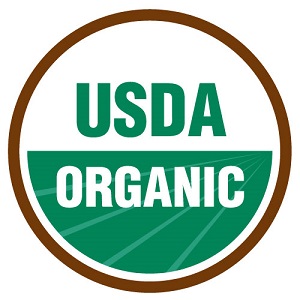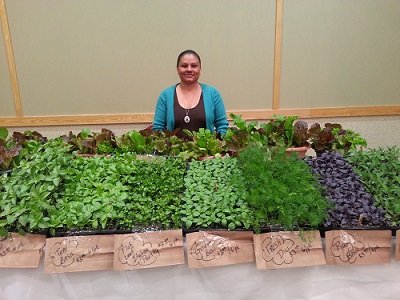Let's Get Fresh: Uncertified Organic
By Bob Workman on September 01, 2013 from Let’s Get Fresh via Connect-Bridgeport.com
While looking back over last week's blog I noticed an oversight in our Vendor Spotlight section that I believe requires a clarification. The boo-boo on my part was in starring the word "uncertified" when referring to the organic status of the Spotlight's subject, Mountain Momma Organics. Actually, that wasn't the boo-boo. Forgetting to add the appropriate footnote at the bottom of the page was the boo-boo!
In the course of trying to come up with the text of the footnote I began to realize that the footnote would make an interesting blog in and of itself. You see, it's the next word of the sentence in question that becomes the real heart of the matter. That misunderstood and often mis-used word "organic". Just what does it mean and, specifically, what does the phrase "USDA Certified Organic (USDA-CO)" represent and just why is it all so confusing?

Over the five years of the Market's existence we have had many customers call or come by the information tent and ask if any of our farmers practice organic methods. Our standard answer is this: “Most of the Market's farmers follow as closely as they can the guidelines of the USDA-CO program. Some more than others. You should ask each farmer how closely they adhere to these guidelines.” We then attempt to explain the cumbersome, expensive process by which a farmer becomes USDA-CO. As the questioner’s eyes are glazing over they begin to realize that “organic” is, in many cases, in the eyes and taste buds of the beholder. As a point of reference the main points of USDA certification are as follows:
• Pesticide-Free
• Herbicide-Free
• Genetically-Modified Organism (GMO) Free
• No Synthetic Fertilizers
• No Irradiation or Sewage Sludge (Seriously?)
• For livestock, no hormones or antibiotics
In addition, the land being used to grow USDA-CO organic crops has to be free from these items for a period of three years before the USDA-CO label can be applied. And like most government regulations this is just the tip of the iceberg. There are sub-headings, exceptions, and additional explanations to each of the items listed above. Plus there is a regularly amended National List of Allowed and Prohibited Substances that has to be tracked. Just the record keeping requirements alone would require most small farms to hire extra help.
With the proliferation of modern farming technology in the post-WWII era, organic farming became labeled, usually derisively, as a part of the '60s hippie counter-culture. It remained that way until Americans, confronted with the two-headed monster of heart disease and diabetes, began demanding to know more about how their food was being produced. Then, as large corporate food processors started realizing that money could be made from charging a premium for food with the "all-natural" or "organic" label (of course, the food in question was usually neither) the government used its consumer protection powers to step in and set some standards. Hence, Congress approved The Organic Food Production Act of 1990 (yes, back then they actually passed legislation!) and, twelve years later, the USDA created the National Organic Program (NOP).
Ironically, in many cases it was these same “large corporate food processors” that made our food supply unhealthy in the first place with their use of chemical additives that supposedly enhance taste and/or extend shelf-life. Nowadays, these processors are buying up every organic food company they can get their hands on. See chart here: http://www.cornucopia.org/who-owns-organic/
By most accounts the NOP has been a success. Consumers can now look for the green USDA Organic seal and be reasonably sure that what they are buying is organically grown. Where the NOP fails, and where my term *uncertified comes in, is with the smallest of farmers. In retrospect, I think NON-certified or perhaps SELF-certified would be a better description for most of the farmers who ply their wares at the BFM and other farmers markets but choose not to pursue USDA certification. As I alluded to earlier it's not an inexpensive proposition to go thru the USDA-CO process. Plus a farm has to be re-certified on an annual basis. In fact, the NOP seems to acknowledge that expense by exempting farms that adhere to organic practices but have annual sales less than $5,000. These ultra-small farms are allowed to use the term "organic" in their marketing. Farms that exceed this limit in sales are subject to fines if they are found using the word in question for marketing purposes. Personally, I think the $5,000 cut-off could stand to be raised.
It's not surprising that there has been a backlash against the NOP by some small farms and/or their trade organizations. Many small farmers complain that the NOP plays into the hands of large corporate farms and food processors at their expense. It also hasn't helped the NOP cause that a few corporations have used their lobbying power to get some questionable new products added to the Allowed section of the National List of Allowed and Prohibited Substances (see http://tinyurl.com/peoukl2).
In response to this backlash, there are now independent organizations such as Certified Naturally Grown (www.naturallygrown.org) and The Farmer's Pledge (https://www.nofany.org/farmers-pledge) that small farmers can turn to for organic certification separate from the NOP. Some of these new certifiers even go above and beyond the NOP to include guidelines for such things as labor practices and the use of alternative energy sources. While some will inevitably say that these new certifiers muddy the organic waters I happen to think the more the merrier. This leaves it up to consumers to decide which is best for their own particular needs.
Yes, at the end of the day what it really comes down to is you and me. The world-renowned American Consumer. If you are like me and concerned about where your food comes from and how it was grown you have to ask questions and get to know your local farmer. For example, ask if you can come out and visit their farm sometime and see exactly what they mean when they say "organic" or "naturally-grown". This is the beauty of the farmers market experience in a nutshell. The personal relationships you can develop with the folks who grow your food are invaluable. Eventually the terms “certified”, “uncertified”, “non-certified”, or “self-certified” become a moot point. You just come to trust that the farmer is selling you the healthiest, tastiest food possible.
Show me a grocery store where you can ask the farmer who grew the "vine-ripened" tomatoes if he used organic or heirloom seeds. Oh, that's right, he lives in California or Mexico or....anywhere but here.
Until next week, Stay Fresh!
The Bridgeport Farmers Market Association is the five member all volunteer board of directors that governs the Bridgeport Farmers Market. It is supported by a wonderful group of community volunteers who help in the setup and maintenance of the market. For more information on the Farmers Market or to see how you can help please e-mail us at bridgeportfarmersmarket@yahoo.comor, better yet, LIKE us on Facebook or follow us on Twitter.
If you want more information on the whole organic argument I would suggest the following websites in addition to the ones previously mentioned:
http://tinyurl.com/5vanen (this is a shortened link to the USDA NOP page)
(This is a fascinating story of one WV food producer’s USDA-CO experience. And, for the record, no I am not a vegan!)
VENDOR SPOTLIGHT
NAME: Green Acres Farm
OWNERS: Pati and Lupe Espinoza
LOCATION: Rock Cave, WV
CONTACT: Phone: 304-997-9656 E-mail: lupilloe@gmail.com
# YEARS IN BUSINESS: 3
# YEARS AT BFM: 3
FARM VISITS: By appointment
SPECIALTIES: Wide variety of tomatoes and potatoes, melons, corn, lettuces, 15 varieties of peppers, cucumbers, squashes and zucchini, 5 varieties of eggplants, kale, Bok Choy, Swiss chard and other assorted greens, beets, strawberries, and… I’m sure I forgot something but I think you get the point. They grow a lot of good stuff!
OUR TAKE: Pati and Lupe came to WV after spending 15 years running a large farm in Ohio. They originally moved here to manage the produce operation of original BFM vendor CD Cole. In 2010 CD decided to concentrate on his cattle business so Pati and Lupe took over an existing operation in Rock Cave and named it Green Acres Farm. They now market their produce at both the Bridgeport and Glenville Farmers Markets as well as operating four roadside stands throughout the area. In addition, Green Acres produce is featured in the Fish Hawk Acres CSA program and at many local restaurants. These days the farm is a true family affair! The Espinoza’s 15-year old daughter Cristal and 5-year old son Diego both pitch in wherever and whenever they can. And here’s my favorite thing about Pati and Lupe, Lupe and your friendly blogger share a birthday. And it just so happens to be tomorrow, Sept 2…just sayin.


